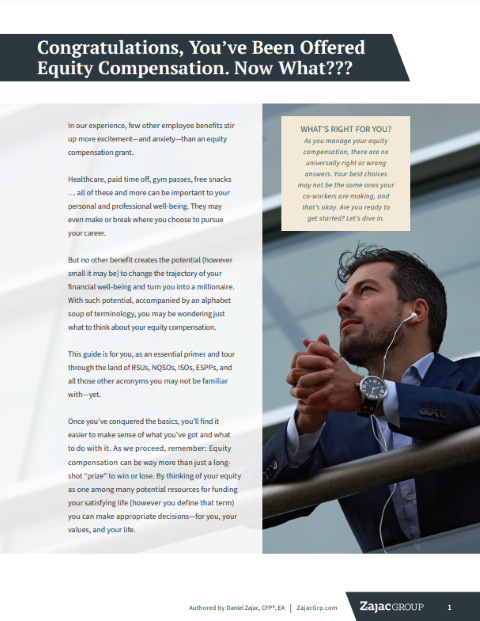Beyond leadership changes and culture shifts, one of the biggest questions you might face during a company acquisition announcement is: What will happen to my equity compensation?
An acquisition has the potential to impact your tax liability, timing, and liquidity—but it all depends on the terms of the acquisition and how your new employer chooses to handle your existing shares.
Let’s walk through how acquisitions typically work, what might happen to your equity, and how to prepare.
How Acquisitions Work
Put simply, an acquisition occurs when one company purchases another. The acquiring company may be a competitor, a firm in a related industry, or even a private equity group. In terms of equity compensation planning, it’s important to remember that the transaction could involve two public companies, a public company acquiring a private one, or a private firm buying either a public company or another private entity.
Employees are usually informed once the deal is publicly announced, at which point the leadership of the selling company will begin to share the relevant details, including the expected closing date and any high-level implications for compensation. You’ll likely be told how your equity compensation will be handled in the official acquisition documents—though this information may not be immediately available. You may need to wait until the legal teams complete their work before getting answers to specific questions.
Common Types of Acquisitions
The way an acquisition is structured can significantly impact your equity compensation and tax liability. Most deals fall into one of three categories, each with its own implications for how your stock options or RSUs are treated.
GET THIS GUIDE
When it comes to your finances, it's important to understand what you have, what you should consider, and how it can impact your personal goals. This guide is the best place to start.
1. All-Cash Acquisition
In an all-cash deal, the acquiring company commonly purchases shares of the acquired company using cash (though you’ll want to check the specific details of your company’s merger, since the circumstances can vary). If some of your shares or options have vested, you’ll typically receive a cash payout based on the fair market value of the shares on the date the deal closes.
Often, the acquisition terms include accelerated vesting provisions (though in some cases, unvested equity could be forfeited). In other words, the vesting on some or all of your unvested awards may be accelerated so that such awards would also be cashed out when the acquisition closes..
An all-cash deal can provide employees of the acquired company with immediate liquidity since they’ll receive a lump sum payment for their shares. If that’s the case, employees are then free to do as they please with the funds—purchase shares of the new company’s stock, diversify their portfolio with other investments, or spend it on something meaningful (like a downpayment on a house).
2. All-Stock Acquisition
In an all-stock transaction, your existing equity is generally converted into equivalent stock awards in the new company. Unlike an all-cash deal, you will not receive a lump sum of cash for your options. Rather, your existing shares transition from your old company to your new company (based on a formula that equates the market value of awards before and after the acquisition).
While each deal may be set up differently, typically your vested equity remains vested, and unvested grants will continue to vest—though it’s possible the schedule could change, again, as a result of the acquisition.
If you have stock options, these will likely be exchanged for options of similar value as well, with the appropriate adjustments to the number of options and the strike price, if necessary.
3. Cash and Stock Combination
Just as it sounds, some acquisition deals will provide employees with a combination of cash and stock. The exact breakdown between how much of your original employer’s shares is paid out in cash versus rolled into the acquiring company’s stock will depend on the acquisition’s terms.
Understanding the Tax Impact
An all-cash transaction effectively forces the sale of stock or cash out of vested options. In most cases, a payout from an all-cash transaction is a taxable event. Whether the proceeds are subject to ordinary income tax or capital gains tax, however, will depend on the type of equity and the holding periods.
For example, if you’ve held onto your vested RSUs for longer than a year before the acquisition essentially forced a sale, you will pay the more favorable long-term capital gains tax rate on the profits of the sale. The taxable amount will be the difference between the fair market value of the shares at the time they vested and the fair market value at the time the new company cashed them out.
If the deal is structured as an all-stock acquisition, the conversion of equity into shares of the new company may qualify as a tax-free exchange according to the IRS. However, if your RSUs vest early as part of the acquisition, that portion could be taxed as ordinary income, even if the rest of your equity is not subject to tax. Once the original stock is converted to your new company’s stock, you’ll follow along with the normal tax treatment of your equity comp (RSUs, ISOs, NQSOs, etc.) when the time comes to sell your shares.
Combination deals are more nuanced, since the tax liability will depend on the terms of the agreement. The cash portion of your payout is typically taxed immediately, while the stock component might not be taxed until you sell.
What Might Happen to Your ISOs, NQSOs, or RSUs After an Acquisition?
The mechanics of how your equity is handled during and after an acquisition depend largely on the type of compensation you hold and the terms of the deal.
Stock Options (ISOs and NQSOs)
If you hold stock options, the acquiring company may choose to do a stock merger. If that’s the case, they’ll convert your existing ISOs or NQSOs into the acquiring company’s options based on the value of the acquiring company’s stock. With a stock merger, the new company will typically aim to preserve the existing fair market value of your grants, adjusting for strike price and share quantity.
For example, based on the fair market value and the acquisition agreement, one share of old company stock might be converted to a fraction of new company stock (say 0.75 shares). That way, you’re maintaining roughly the same value, even if the actual number of shares changes (to reflect the new company’s stock price).
Another option is a stock buyout, during which you’re given cash for the value of your vested and/or unvested stock options. The price you receive for your shares will be determined by the acquisition agreement.
You could, again, be offered some combination of the two—some stock is converted to new company stock, while the rest is bought out in exchange for a lump sum of cash.
RSUs
How your RSUs are handled will depend largely on whether the units have already vested.
If they have, you may receive a cash payout for the value of the vested units or have your shares converted into stock of the acquiring company. Similar to stock options, the conversion may be based on the financial value of your original company’s stock at the time the acquisition is finalized, though the specifics will depend on the final agreement.
For unvested RSUs, the acquiring company may continue the original vesting schedule, adjust it, or accelerate vesting so that your shares become available once the acquisition has been completed.
What If You Work for a Private Company?
Because private companies don’t have a publicly traded stock price, your equity valuation depends on internal calculations and negotiation between the parties. You may have a choice (or be forced) to roll your shares over to the new company’s stock. Or, the acquisition may serve as a liquidity event, during which you’re able to cash out your shares. Just keep in mind, a cash-out will likely be a taxable event.
Other Things to Consider
Beyond the structure of your equity and the tax implications, there are a few other variables to watch closely.
First, and particularly for public companies, the value of your equity may fluctuate between the time an acquisition is announced and the time the paperwork is finalized and signed. If the market responds positively to the deal, your equity value may rise. If there are concerns about integration, financing, or regulatory approval, the opposite could occur. Even outside influences like a sudden economic downturn or geopolitical unrest can move the stock market as a whole—which could impact the value of your shares during this period.
In the wake of a merger or acquisition announcement, your shares may also be subject to trading restrictions, which are established to reduce the risk of insider trading accusations. Keep in mind that blackout periods only apply if the acquiring company is publicly traded.
Preparing for an Acquisition or Merger? We’re Here to Help
An acquisition can be both exhilarating and a little nerve-wracking for employees, especially those managing a sizable amount of equity compensation.
To prepare, stay on top of any acquisition-related documents you receive throughout the process. It may help to review your equity agreements as well, though as we’ve discussed, the future of your existing shares or units will ultimately depend on the acquisition agreement.
If you’re in the process of navigating an acquisition or have questions about your equity compensation in general, we offer personalized guidance for professionals with complex compensation packages. Our goal is to empower you to make confident, informed decisions along every step of your financial journey. Schedule a call with our team to get started.











0 Comments